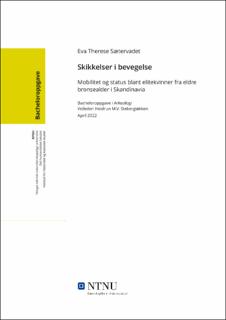Skikkelser i bevegelse
Bachelor thesis
Permanent lenke
https://hdl.handle.net/11250/2997573Utgivelsesdato
2022Metadata
Vis full innførselSamlinger
Sammendrag
Denne bacheloroppgaven har som mål å belyse mobilitet blant elitekvinner i Skandinavia i eldre bronsealder, og se på hvordan ulike mobilitetsmønstre kan knyttes til ulike samfunnsroller som kvinner hadde i denne perioden. Oppgaven utforsker tre elitekvinner fra eldre bronsealder funnet i Danmark; i Egtved, Skrydstrup og Ølby. Bronsealderen var en tid uten skriftlig språk, og man er derfor avhengig av arkeologisk materiale for å kunne tolke periodens samfunnsstruktur. Materiell kultur har stor påvirkning på hvordan fortidens kjønnsroller og identiteter tolkes, og den materielle kulturen fra de tre gravene stiller som viktige deler i tolkningen av deres kvinneroller. Androsentristiske syn der et maskulint perspektiv regjerer blir ofte satt som hovedvinkling i representasjonen av kulturer. Gjennom analyser av kvinnenes mobilitet og materielle kultur vil nye perspektiver på makt og status presenteres, noe som kan være en motvekt mot androsentriske kjønnsmyter fra egen samtid som muligens feilaktig overføres inn i oppfatningen av fortiden. The goal of this bachelor thesis is to shed light on mobility among elite women in Scandinavia during the Early Nordic Bronze Age and look at how different mobility patterns can be connected to different societal roles women had during this time period. The thesis explores three elite women from the Early Bronze Age who were unearthed in Denmark; in Egtved, Skrydstrup and Ølby. The Bronze Age was a time period with no written language, which makes archaeological material essential to the interpretation of the societal structures of the period. Material culture has a great influence on how gender roles and identities of the past are interpreted, and the material culture from the three graves serves as important pieces in deciphering their roles as women. Androcentric views where a masculine perspective rules, are often assigned the main perspective in the representation of cultures. Through analysis of these women, their mobility and their material culture, new perspectives on power and status will be presented. This could be a counterweight against androcentric myths about gender from one's own contemporary perception, which may wrongfully be projected into ideas of the past.
